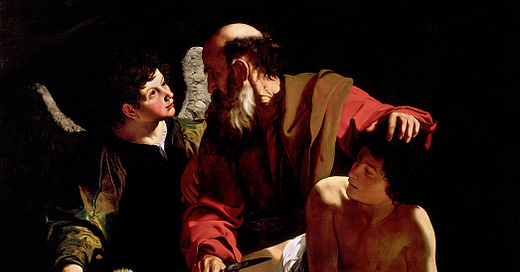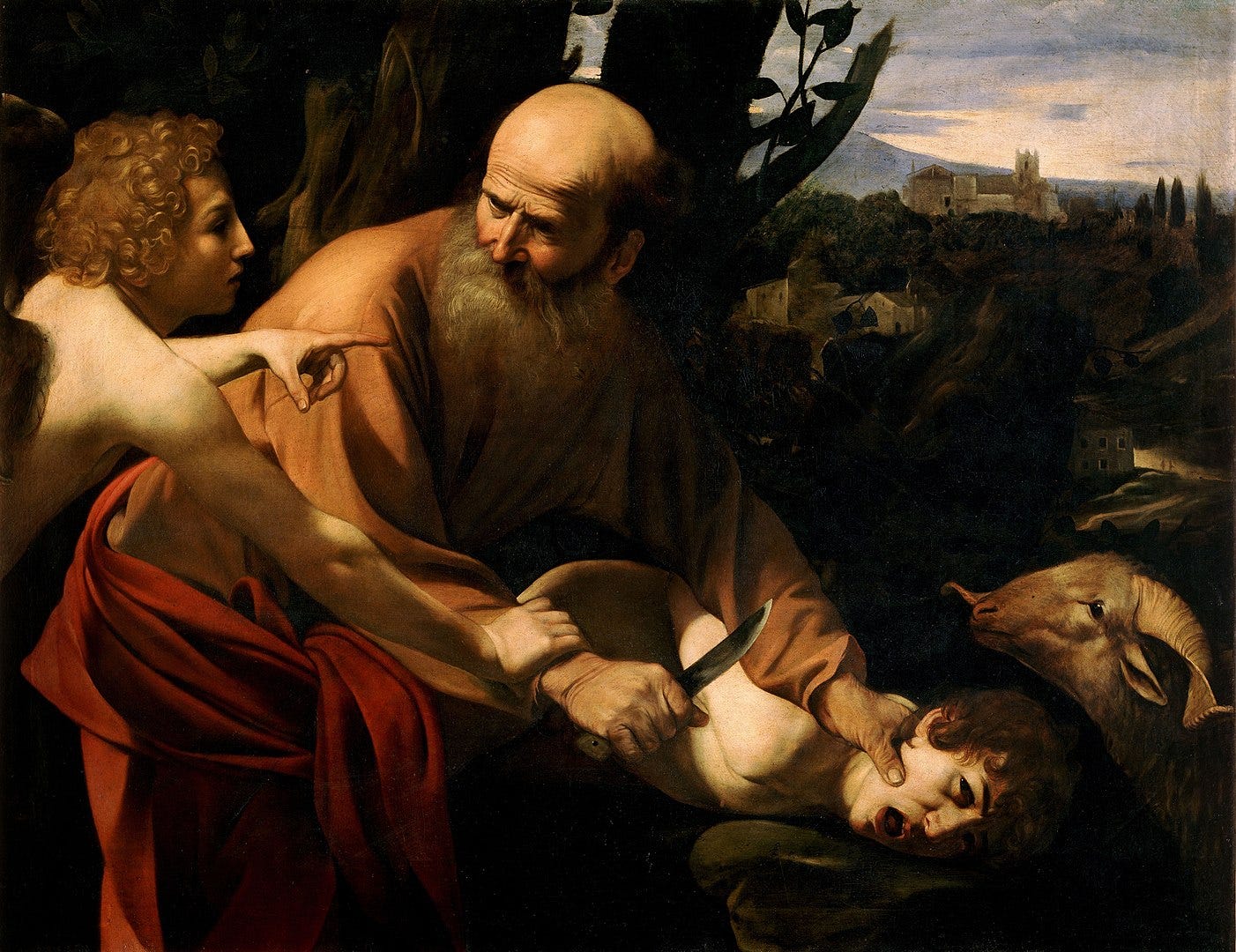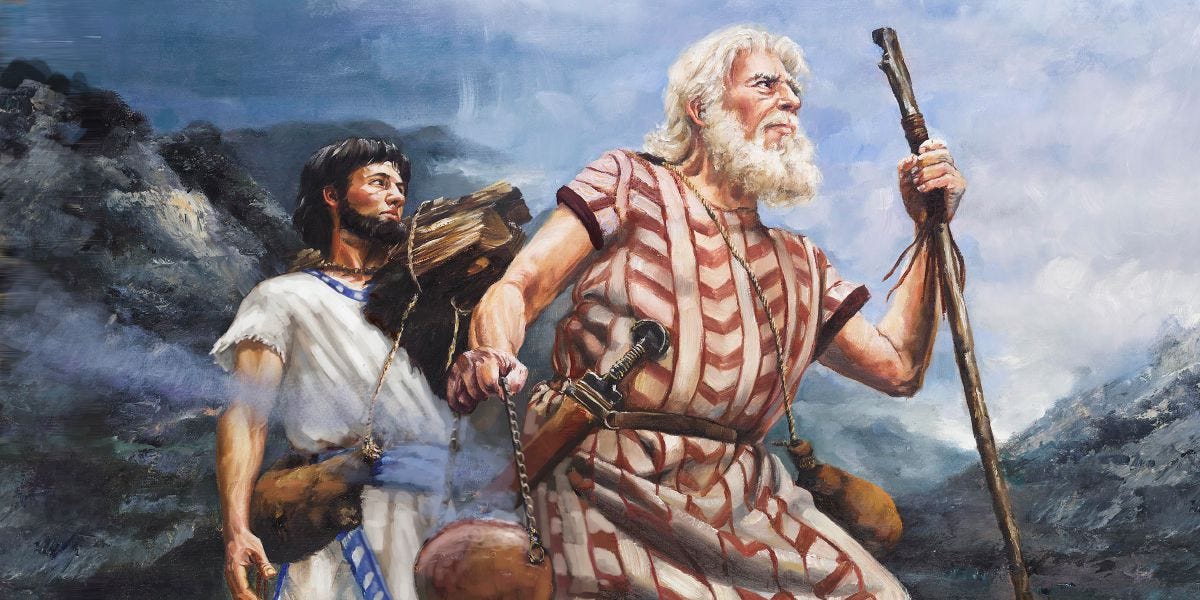A good boss doesn’t ask his employees to do anything he wouldn’t do.
So it is with God, the King of kings, Lord of lords, and, I guess, Boss of bosses. In the first reading, He commands Abraham to sacrifice his only son. Although God bails him out before Abraham does the deed, God Himself makes the same sacrifice.
And He actually goes through with it!
Reading 1
Gn 22:1b-19
God put Abraham to the test. He called to him, "Abraham!"
"Here I am," he replied.
Then God said: "Take your son Isaac, your only one, whom you love, and go to the land of Moriah. There you shall offer him up as a burnt offering on a height that I will point out to you." Early the next morning Abraham saddled his donkey, took with him his son Isaac, and two of his servants as well, and with the wood that he had cut for the burnt offering, set out for the place of which God had told him.
On the third day Abraham got sight of the place from afar. Then he said to his servants: "Both of you stay here with the donkey, while the boy and I go on over yonder. We will worship and then come back to you."
Thereupon Abraham took the wood for the burnt offering and laid it on his son Isaac's shoulders, while he himself carried the fire and the knife. As the two walked on together, Isaac spoke to his father Abraham: "Father!" he said.
"Yes, son," he replied.
Isaac continued, "Here are the fire and the wood, but where is the sheep for the burnt offering?"
"Son," Abraham answered, "God himself will provide the sheep for the burnt offering."
Then the two continued going forward.
When they came to the place of which God had told him, Abraham built an altar there and arranged the wood on it. Next he tied up his son Isaac, and put him on top of the wood on the altar. Then he reached out and took the knife to slaughter his son. But the LORD's messenger called to him from heaven, "Abraham, Abraham!"
"Here I am," he answered.
"Do not lay your hand on the boy," said the messenger. "Do not do the least thing to him. I know now how devoted you are to God, since you did not withhold from me your own beloved son."
As Abraham looked about, he spied a ram caught by its horns in the thicket. So he went and took the ram and offered it up as a burnt offering in place of his son. Abraham named the site Yahweh-yireh; hence people now say, "On the mountain the LORD will see."
Again the LORD's messenger called to Abraham from heaven and said: "I swear by myself, declares the LORD, that because you acted as you did in not withholding from me your beloved son, I will bless you abundantly and make your descendants as countless as the stars of the sky and the sands of the seashore; your descendants shall take possession of the gates of their enemies, and in your descendants all the nations of the earth shall find blessing--all this because you obeyed my command."
Abraham then returned to his servants, and they set out together for Beer-sheba, where Abraham made his home.
Sometimes the lectionary doesn’t match up the Old and New Testament readings exactly. This story would’ve fit perfectly with Sunday’s Gospel. Abraham is willing to sacrifice his greatest gift because God asks him to.
Caravaggio, one of my favorite painters,1 depicts today’s first reading like this—
As beautifully rendered as this scene is, it makes no sense.
The Bible doesn’t specifically state how old Isaac is at this point, but tradition tells us he’s in his mid-20s. At a bare minimum, he’s a teenager. Abraham, however, is well over 100.
So the scene more likely looked something like this—
In other words, despite the common name for this episode being “The Binding of Isaac,” it’s basically impossible that Abraham overpowered Isaac.
It’s notoriously difficult to convey sarcasm in text,2 but I think Isaac isn’t exactly serious when he asks where the sheep is. Abraham is making a great sacrifice to God, but Isaac goes willingly, trusting his human father and his Father in heaven.
Responsorial Psalm
Ps 115:1-2, 3-4, 5-6, 8-9
R. I will walk in the presence of the Lord, in the land of the living.
Not to us, O LORD, not to us
but to your name give glory
because of your kindness, because of your truth.
Why should the pagans say,
"Where is their God?"
R. I will walk in the presence of the Lord, in the land of the living.
Our God is in heaven;
whatever he wills, he does.
Their idols are silver and gold,
the handiwork of men.
R. I will walk in the presence of the Lord, in the land of the living.
They have mouths but speak not;
they have eyes but see not;
They have ears but hear not;
they have noses but smell not.
R. I will walk in the presence of the Lord, in the land of the living.
Their makers shall be like them,
everyone who trusts in them.
The house of Israel trusts in the LORD;
he is their help and their shield.
R. I will walk in the presence of the Lord, in the land of the living.
In ancient times, when your enemy was in trouble, a common taunt was “Where is your God?”
This Psalm is a response. The God of Israel is real, not an idol made of silver and gold. The pagan sculptures have the appearance of gods, but aren’t truly alive.
So the psalmist calls on God to prove the pagans wrong, to show His glory by rescuing them from disaster.
Alleluia
2 Cor 5:19
R. Alleluia, alleluia.
God was reconciling the world to himself in Christ
and entrusting to us the message of reconciliation.
R. Alleluia, alleluia.
Jesus forgives sins, but he’s also allowed us to participate in salvation by spreading his message to the world.
Gospel
Mt 9:1-8
After entering a boat, Jesus made the crossing, and came into his own town. And there people brought to him a paralytic lying on a stretcher. When Jesus saw their faith, he said to the paralytic, "Courage, child, your sins are forgiven."
At that, some of the scribes said to themselves, "This man is blaspheming."
Jesus knew what they were thinking, and said, "Why do you harbor evil thoughts? Which is easier, to say, 'Your sins are forgiven,' or to say, 'Rise and walk'? But that you may know that the Son of Man has authority on earth to forgive sins"– he then said to the paralytic, "Rise, pick up your stretcher, and go home."
He rose and went home. When the crowds saw this they were struck with awe and glorified God who had given such authority to men.
Matthew was one of the later Gospels,3 being aware of both Mark and Luke. So by the time Matthew was writing, the theology of reconciliation had developed a little.
That’s why the last line is slightly different than Mark’s4 version: Now some of the scribes were sitting there asking themselves, “Why does this man speak that way?* He is blaspheming. Who but God alone can forgive sins?”
Jesus conferred the power of forgiveness to the Apostles and their successors, which Matthew was aware of.
Still, the point of the story remains: forgiveness of sins and reconciling with God is the most important miracle occurring here. Just as the psalmist requested, Jesus demonstrates his power to the unbeliever in a visible way—allowing the man to walk.
That’s not going to happen for every paralytic. But if we go to confession, our sins will be forgiven every time.
Super unpopular opinion, I know.
No, really?
It may or may not have been written after John.






